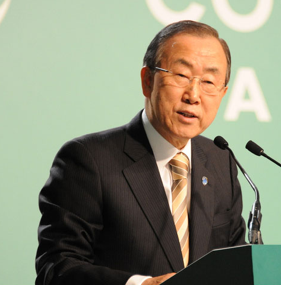In an informal briefing to UN Member States, UN Secretary-General Ban Ki-moon indicated his priorities for 2015, and discussed UN efforts in the areas of development, peace and security, and human rights.
He also highlighted four main moments for action in 2015, as well as needs within the UN's development system.
 8 January 2015: In an informal briefing to UN Member States, UN Secretary-General Ban Ki-moon indicated his priorities for 2015, and discussed UN efforts in the areas of development, peace and security, and human rights. He also highlighted four main moments for action in 2015, as well as needs within the UN’s development system.
8 January 2015: In an informal briefing to UN Member States, UN Secretary-General Ban Ki-moon indicated his priorities for 2015, and discussed UN efforts in the areas of development, peace and security, and human rights. He also highlighted four main moments for action in 2015, as well as needs within the UN’s development system.
Speaking at UN Headquarters in New York, US, Ban said 2014 had been a year of turmoil that “pushed UN response capacities to the limit.” He honored the unprecedented number of UN peacekeepers, humanitarian workers, and personnel deployed around the world, and asked for more to be done to ensure their security. He also stressed the recent outbreak of Ebola and international efforts to combat it, which Ban said still fall short of what is needed. He said that the UN must be prepared for new epidemics, wherever they may occur, by improving its rapid response capabilities.
Turning to 2015, the “year of opportunity ahead,” Ban said the year will include the culmination of the Millennium Development Goals (MDGs), as well as the adoption of the next international development framework, which he stated must be universal and place people and planet at the center. He also stressed that the development agenda must be supported by a new global partnership that fulfills commitments, disseminates technology, and is made up of all global sources of financing.
In his Synthesis Report on the post-2015 development agenda, an advance version of which was released in December 2014, the Secretary-General offers six essential elements for the agenda which he said can help to ensure that this bold vision is expressed. The 8 January briefing served as the formal presentation of the final Synthesis Report.
On climate change, Ban stated that everywhere in the world, countries, citizens, cities, individuals, and CEOs are taking action and recognize the benefits of mitigating the changing climate. He urged Member States to come forward with ambitious commitments in their intended nationally determined contributions (INDCs) in the first quarter of 2015, as well as to fulfill their promises of financing to the Green Climate Fund (GCF).
Ban highlighted four main moments for action in 2015: in March, the Third World Conference on Disaster Risk Reduction (DRR) in Sendai, Japan, which he said will “set the course for greater resilience”; in July, the Third International Conference on Financing for Development (FfD3), where he said that Member States will agree on public financing and investments for the credibility of the next development agenda; in September, the adoption of a “bold and integrated agenda for sustainable development” and the Post-2015 Summit in New York, NY; and in December, the 21st session of the Conference of the Parties (COP 21) to the UN Framework Convention on Climate Change (UNFCCC), where he urged Member States to “ensure a meaningful, ambitious, and universal climate change agreement.”
On peace and security, the Secretary-General emphasized that response to the many security threats around the world cannot be limited to military action alone, but that the world should address the conditions that gave rise to extremism in the first place. From fighting in Syria, Ukraine, Libya, Afghanistan, South Sudan, Iraq, the Central African Republic, Mali, and the Democratic Republic of the Congo, to the on-going Israeli-Palestinian conflict, to growing global threats of terrorism, and the availability of deadly weapons, Ban appealed to the conscience of all those involved in “senseless violence,” especially when targeted against civilians and innocents.
His remarks on human rights and the rule of law called for governments and non-state actors alike to have greater respect for the Geneva Conventions, and for Member States to operationalize the Responsibility to Protect norms. He introduced that the UN will be focusing on a new “Human Rights Upfront” initiative, which will ensure that the institution acts earlier and more effectively to prevent atrocities.
Finally, the Secretary-General stressed that the UN must be better “fit for purpose” in the years ahead, with a development system able to support and implement the new agenda and a humanitarian response system better able to fulfill growing needs. He expressed his concern that the UN General Assembly (UNGA) had not completed much of its work for the 69th session in 2014, and had particularly not reached agreement on the establishment of a UN Partnerships Facility. Ban urged that this facility to better partner with stakeholders and the private sector must be in place when the development agenda is launched in September of 2015.
With the UN’s 70th anniversary in 2015, Ban called for the support, responsibility and leadership of Member States to “work together to make this year a time for global action.” [UN Secretary-General Remarks] [UN Press Release] [UN Webcast] [IISD RS Sources]